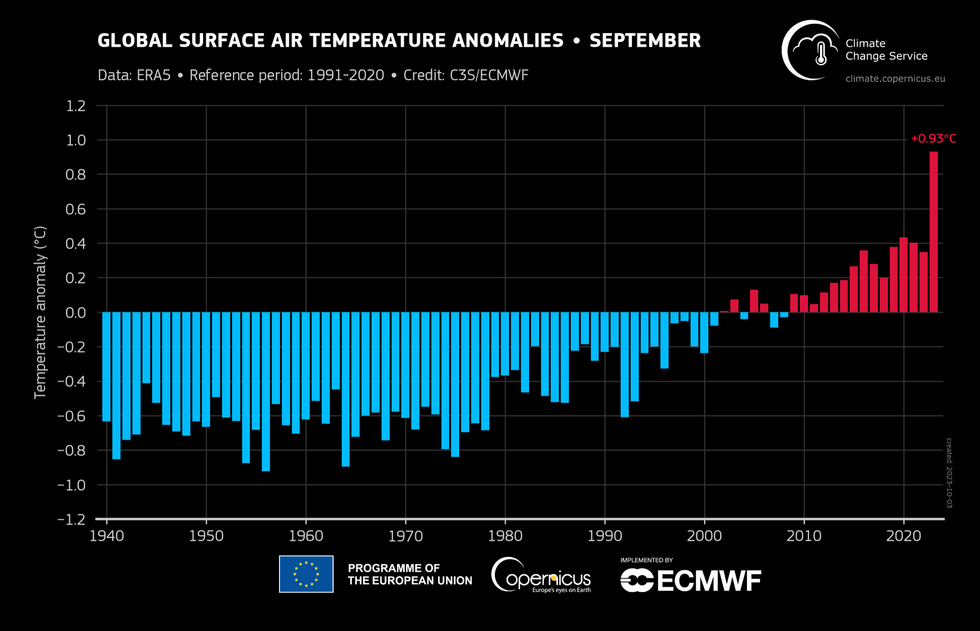

SUBSCRIBE TO OUR FREE NEWSLETTER
Daily news & progressive opinion—funded by the people, not the corporations—delivered straight to your inbox.
5
#000000
#FFFFFF
To donate by check, phone, or other method, see our More Ways to Give page.


Daily news & progressive opinion—funded by the people, not the corporations—delivered straight to your inbox.

The sun rises behind the skyline of midtown Manhattan and the Empire State Building amid a New York City heatwave on September 6, 2023.
"The unprecedented temperatures for the time of year observed in September—following a record summer—have broken records by an extraordinary amount."
Europe's Copernicus Climate Change Service said Thursday that 2023 is on track to be the hottest year ever recorded following a string of scorching months, including an unusually warm September that stunned scientists.
Copernicus director Carlo Buontempo toldThe Associated Press that September was "just mindblowing" and that he has "never seen anything like that in any month in our records," echoing the sentiments of other experts.
The European climate agency said Thursday that last month was the warmest September on record globally and "the most anomalous warm month of any year" in its dataset going back to 1940.
"The month as a whole was around 1.75°C warmer than the September average for 1850-1900, the preindustrial reference period," the agency noted. "The global temperature for January-September 2023 was 0.52°C higher than average, and 0.05°C higher than the equivalent period in the warmest calendar year (2016)."
Samantha Burgess, Copernicus' deputy director, said in a statement that "the unprecedented temperatures for the time of year observed in September—following a record summer—have broken records by an extraordinary amount."
"This extreme month has pushed 2023 into the dubious honor of first place—on track to be the warmest year and around 1.4°C above preindustrial average temperatures," Burgess added. "Two months out from COP28—the sense of urgency for ambitious climate action has never been more critical."

The new Copernicus data came hours after the release of a
United Nations report that called on nations worldwide to end fossil fuel exploration by 2030, warning that countries are not acting with sufficient urgency to rein in planet-heating pollution.
Simon Stiell, the U.N. climate chief, said the report "puts the cards on the table—except this is not a game."
"We know that we as the global community are not on track towards achieving the long-term goals of the Paris Agreement and that there is a rapidly closing window of opportunity to secure a livable and sustainable future," said Stiell.
Trump and Musk are on an unconstitutional rampage, aiming for virtually every corner of the federal government. These two right-wing billionaires are targeting nurses, scientists, teachers, daycare providers, judges, veterans, air traffic controllers, and nuclear safety inspectors. No one is safe. The food stamps program, Social Security, Medicare, and Medicaid are next. It’s an unprecedented disaster and a five-alarm fire, but there will be a reckoning. The people did not vote for this. The American people do not want this dystopian hellscape that hides behind claims of “efficiency.” Still, in reality, it is all a giveaway to corporate interests and the libertarian dreams of far-right oligarchs like Musk. Common Dreams is playing a vital role by reporting day and night on this orgy of corruption and greed, as well as what everyday people can do to organize and fight back. As a people-powered nonprofit news outlet, we cover issues the corporate media never will, but we can only continue with our readers’ support. |
Europe's Copernicus Climate Change Service said Thursday that 2023 is on track to be the hottest year ever recorded following a string of scorching months, including an unusually warm September that stunned scientists.
Copernicus director Carlo Buontempo toldThe Associated Press that September was "just mindblowing" and that he has "never seen anything like that in any month in our records," echoing the sentiments of other experts.
The European climate agency said Thursday that last month was the warmest September on record globally and "the most anomalous warm month of any year" in its dataset going back to 1940.
"The month as a whole was around 1.75°C warmer than the September average for 1850-1900, the preindustrial reference period," the agency noted. "The global temperature for January-September 2023 was 0.52°C higher than average, and 0.05°C higher than the equivalent period in the warmest calendar year (2016)."
Samantha Burgess, Copernicus' deputy director, said in a statement that "the unprecedented temperatures for the time of year observed in September—following a record summer—have broken records by an extraordinary amount."
"This extreme month has pushed 2023 into the dubious honor of first place—on track to be the warmest year and around 1.4°C above preindustrial average temperatures," Burgess added. "Two months out from COP28—the sense of urgency for ambitious climate action has never been more critical."

The new Copernicus data came hours after the release of a
United Nations report that called on nations worldwide to end fossil fuel exploration by 2030, warning that countries are not acting with sufficient urgency to rein in planet-heating pollution.
Simon Stiell, the U.N. climate chief, said the report "puts the cards on the table—except this is not a game."
"We know that we as the global community are not on track towards achieving the long-term goals of the Paris Agreement and that there is a rapidly closing window of opportunity to secure a livable and sustainable future," said Stiell.
Europe's Copernicus Climate Change Service said Thursday that 2023 is on track to be the hottest year ever recorded following a string of scorching months, including an unusually warm September that stunned scientists.
Copernicus director Carlo Buontempo toldThe Associated Press that September was "just mindblowing" and that he has "never seen anything like that in any month in our records," echoing the sentiments of other experts.
The European climate agency said Thursday that last month was the warmest September on record globally and "the most anomalous warm month of any year" in its dataset going back to 1940.
"The month as a whole was around 1.75°C warmer than the September average for 1850-1900, the preindustrial reference period," the agency noted. "The global temperature for January-September 2023 was 0.52°C higher than average, and 0.05°C higher than the equivalent period in the warmest calendar year (2016)."
Samantha Burgess, Copernicus' deputy director, said in a statement that "the unprecedented temperatures for the time of year observed in September—following a record summer—have broken records by an extraordinary amount."
"This extreme month has pushed 2023 into the dubious honor of first place—on track to be the warmest year and around 1.4°C above preindustrial average temperatures," Burgess added. "Two months out from COP28—the sense of urgency for ambitious climate action has never been more critical."

The new Copernicus data came hours after the release of a
United Nations report that called on nations worldwide to end fossil fuel exploration by 2030, warning that countries are not acting with sufficient urgency to rein in planet-heating pollution.
Simon Stiell, the U.N. climate chief, said the report "puts the cards on the table—except this is not a game."
"We know that we as the global community are not on track towards achieving the long-term goals of the Paris Agreement and that there is a rapidly closing window of opportunity to secure a livable and sustainable future," said Stiell.